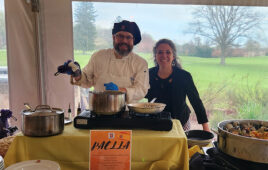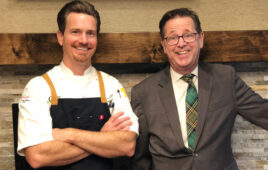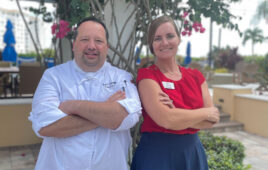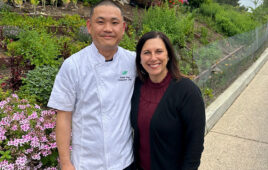Kenwood CC’s newly appointed CEO, Dylan Petrick, is using his in-depth knowledge of foodservice to assist the club’s culinary team as it navigates the COVID-19 challenges.
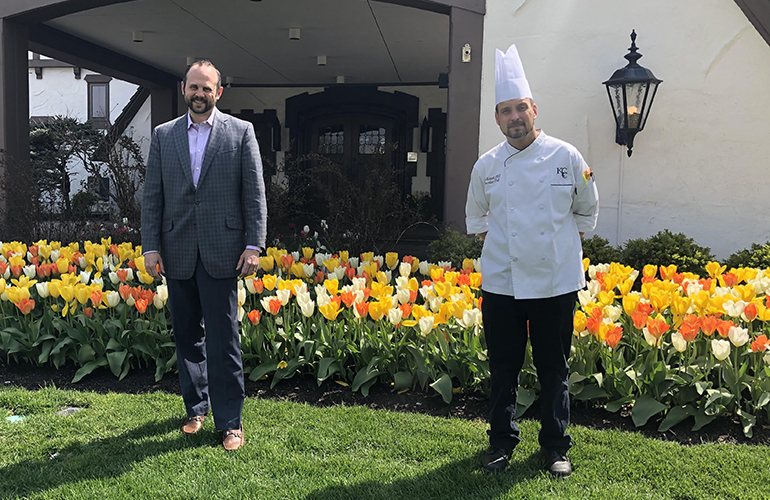 On January 1st, 2020, Dylan Petrick started his new role as Chief Executive Officer of Kenwood Country Club in Cincinnati, Ohio.
On January 1st, 2020, Dylan Petrick started his new role as Chief Executive Officer of Kenwood Country Club in Cincinnati, Ohio.
Then, after only a few months on the job, the coronavirus crisis shifted Kenwood CC’s typically busy a la carte operation into one focused exclusively on carryout service. This brought with it a whole new set of challenges for Petrick, beyond being the “new guy.”
Fortunately, Kenwood, which has 925 members, is staffed with highly talented culinarians—including Sean Sennet, Executive Chef and Luke Anzano, Executive Sous Chef—who have been instrumental in helping Petrick get through the crisis and prepare it for new success after.
CRC: What brought you to Kenwood?
DP: Earlier in my career, after a six-year stint with ClubCorp, I worked at Baltimore (Md.) Country Club (BCC), where I was first Director of F&B and later Assistant GM. I stayed at BCC for two and a half years before I was recruited to Coldstream Country Club, which isn’t far from here. I was with Coldstream for seven months when a recruiter called about Kenwood. He said it was similar to BCC, and that I really needed to consider it.
I went through the interview process and realized he was right.
CRC: What was your first impression of Chef Sennet?
DP: He was reserved, but I’d say that about most of the team here. I didn’t get to meet all of the managers before I started, so I think they all wondered who I was. The club’s prior CEO had been here for almost 18 years, too, so I think they were a little apprehensive, Chef included.
CRC: Had you researched him?
DP: Of course. I knew that [Chef Sennet] had worked with BCC’s Executive Chef, Richard Jallet, so I called Richard up and asked about him. [Chef Jallet] had really positive things to say. Then, once I met Chef, I knew right away that he was extremely talented. He is high energy, humble and a very hard worker.
On one of my first days here, he actually made me lunch. It wasn’t anything fancy or over the top—it was a burger—but it was delicious and I appreciated it more than I think he realized I would.
He is clearly passionate. He cares about people. And the more I work with him, the more impressed I am.
CRC: What has this crisis taught you about Chef Sennet?
DP: That he’s great under pressure. That he’s creative and flexible. And that he’s willing to try new things. He also has an immense network of colleagues that he’s gained through attending the Chef to Chef Conference, and he’s great about seeing what other clubs are doing and trying to find ways to apply those ideas to our operation.
He’s also very honest. Good, bad or indifferent, he’s going to tell me. He’s also willing to say no. I appreciate that type of honesty.
CRC: How are you supporting Chef Sennet and the culinary team now?
DP: I’m trying to find ways to say yes, and to serve as the buffer between members and the culinary team. We’re getting a lot of questions about food safety, as I’m sure all clubs are. I can answer those questions for him.
I’m also trying to listen for the need behind the need. And I’m looking for ways to gently push the needle. We’re not going to get through this crisis and be boring. So I’m trying to help the culinary team evolve and be ready to take the program into the next phase.
CRC: You had some programs and capital plans on hold, right?
DP: Yes, but only for the short term. We’ll still launch the new sushi program, buy the pizza oven and improve and upgrade some kitchen equipment. We just need to get through this crisis first.
CRC: How would you describe your management style?
DP: I’m kind of a mutt when it comes to leadership styles. I like to take strategies from a lot of different sources and people and apply each when most appropriate. I call it situational leadership. It’s basically just believing that one size doesn’t always fit all. Employees are my top priority—if I take care of them, they will take care of the members.
CRC: Before COVID-19, how did you see the operation changing?
DP: I think for a long time, Chef Sennet had to do things a certain way. He was often behind the scenes. But he has started to put himself out there and he’s doing a phenomenal job.
CRC: How do you think the club industry will change as a result of COVID-19?
DP: I think some of the world’s most talented chefs work in clubs—and I think that will become even more apparent. You would never go into a steakhouse and tell the chef to make pizza on Monday, steaks on Tuesday, Asian on Wednesday and Mexican on Thursday—then do to-go for the next two months.
But club chefs have the talent to do so—and I think they will be recognized for it.

